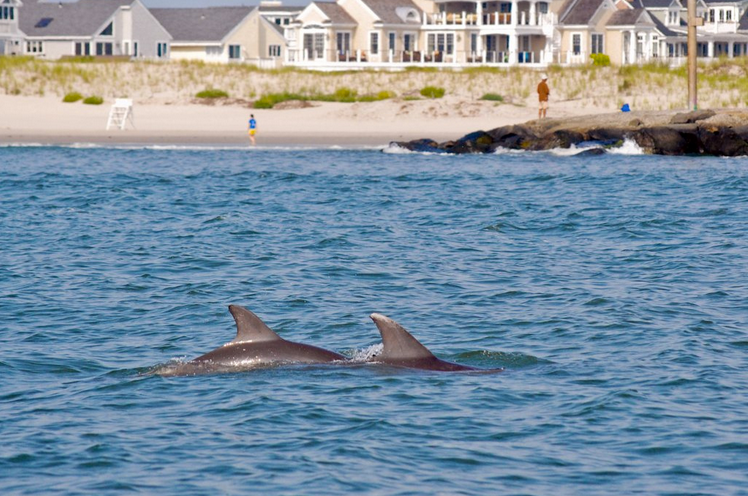State investigating 21 dolphin deaths since July

Dolphins passing by Avalon in August 2010. (Photo: Marc Cappelletti via Flickr)
A high number of recent dolphin deaths has spurred monitoring by the state Department of Environmental Protection’s Division of Fish and Wildlife and an investigation by the Marine Mammal Stranding Center.
The Marine Mammal Stranding Center, a non-profit organization based in Brigantine, has responded to 21 dolphin deaths since July 9, a figure that a state news release deems as “unusually high.”
Twenty bottlenose dolphins and one common dolphin — of varying sizes and ages — have been found “dead or dying on or near beaches” along the state’s coastline, according to the release.
“Dolphins swim close together in pods. Diseases spread between animals when they surface to breathe,” said Robert Schoelkopf, Director of the Marine Mammal Stranding Center, in the release. “There is no evidence that the deaths we are seeing this summer are in any way related to water quality.”
Tests indicate that four dolphins died of pneumonia, and morbillivirus, a naturally occurring virus in dolphin populations, was confirmed in one of the recovered dolphins, the release said. The release further noted that results are pending on additional dolphins to help determine if morbillivirus is present in those animals.
Morbillivirus was linked to the deaths of 90 dolphins in 1987 off New Jersey, the release said.
“We are offering whatever assistance we can, including the use of our conservation officers and our boats to recover dolphins as we work to understand the cause of these deaths,” said Division of Fish and Wildlife Law Enforcement Chief Mark Chicketano in the release.
The state is continually monitoring water quality at bathing beaches, which has been excellent, the release said, adding that there have been no closures of ocean beaches due to elevated bacteria levels.
The public is strongly cautioned to not approach dead or dying dolphins found near shore, as there is an enhanced risk of sharks feeding on the animals, according to Schoelkopf. Pets should also be kept away from dolphins.
If you see a dead or dying dolphin, call the Marine Mammal Stranding Center’s 24-hour hotline at (609) 266-0538.
WHYY is your source for fact-based, in-depth journalism and information. As a nonprofit organization, we rely on financial support from readers like you. Please give today.

